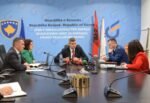With the aim of avoiding tensions, the European Football Confederation (UEFA) has prohibited matches between Kosovo and Serbia in football. These restrictions apply not only to national team games but also to club-level matches.
Once again, the Serbs have found a way to hinder Kosovo, particularly Kosovar football. On Thursday, in Belgrade, UEFA’s Congress was held, where the Serbian delegation removed the flag and symbols of Kosovo from the room where the congress was taking place. This act was either permitted or at least accepted by UEFA.
All national federations had their country’s flag on display in front of their delegation’s table, except for the Kosovo delegation.
The day before the congress, the president of the Kosovo Football Federation (FFK), Agim Ademi, posted a video with the flag of Kosovo placed in the corridor of the venue where UEFA’s activity was being held. A small Kosovo flag was placed on the frame in the congress hall, but it was removed by Serbian federation officials before the meeting began. As an excuse, the Serbian federation cited the video posted by Ademi.
There was no reaction from UEFA regarding the discrimination faced by Kosovo, nor from the Albanian Football Federation. The president of the Albanian Football Federation (FSHF), Armand Duka, is one of UEFA’s vice presidents. Meanwhile, the FFK tried to present its participation as equal to the other federations, although this was not the case.
Serbia’s stance toward Kosovo in the UEFA Congress is nothing new. The Serbs consistently work to hinder and harm Kosovar sports. This is evident in international sporting events and various other activities organized in Serbia, which are not few.
For many years, the participation of Kosovo athletes in international events held in Serbia was never even an issue.
Moves began to take place in 2018. It was the U20 handball players of Kosovo who traveled to Serbia and were located in Kovilovo, near Belgrade. The trip was made under strict security measures. The venue was set to host a qualification tournament for the World Championship. However, after Kosovo held a training session and the photos were made public, there was a strong backlash from the Serbian public. Fans organized protests in downtown Belgrade and near the complex where the Kosovar handball players were staying. On the day of the match between Serbia and Kosovo, after the Norway vs Slovakia match had been played, the Ministry of the Interior decided to block the entry of Kosovo’s handball players into the hall. This caused the European Handball Federation to cancel the entire tournament. The Serbian federation was severely punished in the process.
Subsequent unsuccessful attempts for entry into Serbia were made by Kosovo’s boxers and karate athletes. However, they were not allowed to participate in important international events.
Kosovo athletes participated in Serbia for the first time on February 12, 2022. It was Kosovo’s young athletes who competed in the Balkan U20 Athletics Championship in the gym. The trip was made quietly, and the small competition did not receive much public attention. The Kosovar athletes wore “KOS” on their shirts. Six athletes from Kosovo participated in the event.
No delegation presented their flag at that Balkan competition.
“I’ve been working with calmness and strategy for some time now. We have involved other key figures from the Balkan, European, and global federations. Taboos have been broken. This is a step for other sports, to make them part of joint competitions. Serbia is our neighbor, and we should both, together with other federations, participate in joint events,” stated Halil Sylejmani, president of the Kosovo Athletics Federation, to KOHË.
In March 2022, the World Indoor Athletics Championships were held in Belgrade. Kosovo participated, but the Kosovar athlete was discriminated against in terms of presentation.
Gresa Bakraqi competed in the 1500 meters. The flag of Kosovo on the athlete’s uniform was covered with a black band. On the giant screen in the arena, “KOS” was displayed for Gresa Bakraqi, but the Kosovo flag was not shown. Meanwhile, athletes from other countries were presented with their national flags.

Additionally, the “KOS” abbreviation on Bakraqi’s shirt was partially covered by a patch on the shirt, which was provided by the organizer.
“Everyone is aware of the political situation in that region. World Athletics, the Organizing Committee of Belgrade 2022, and the Kosovo Athletics Federation worked together to ensure that the athlete from Kosovo could compete without tension. This involved the reconciliation of all parties to ensure that the athlete was presented under the country code in World Athletics, KOS,” said the World Athletics Federation.
The “KOS” abbreviation was a compromise, whereas athletes from other countries had their national flags displayed.
Since then, no other Kosovar athletes have participated in events held in Serbia. In fact, there has been little interest in doing so. For events held in Serbia, Kosovar federations generally do not express interest. There is an understanding with international federations not to insist on competing in Serbia.
In some cases, Serbian athletes have refused to compete against Kosovar athletes in international events in other countries, particularly in the Balkans. However, in more serious federations, like judo, this is not allowed. In judo, there are often matches between athletes from Kosovo and Serbia.
In team sports, besides UEFA, other organizations also prevent Kosovo-Serbia matchups. This situation is expected to continue for many years.
The UEFA Congress in Belgrade is evidence of this.







